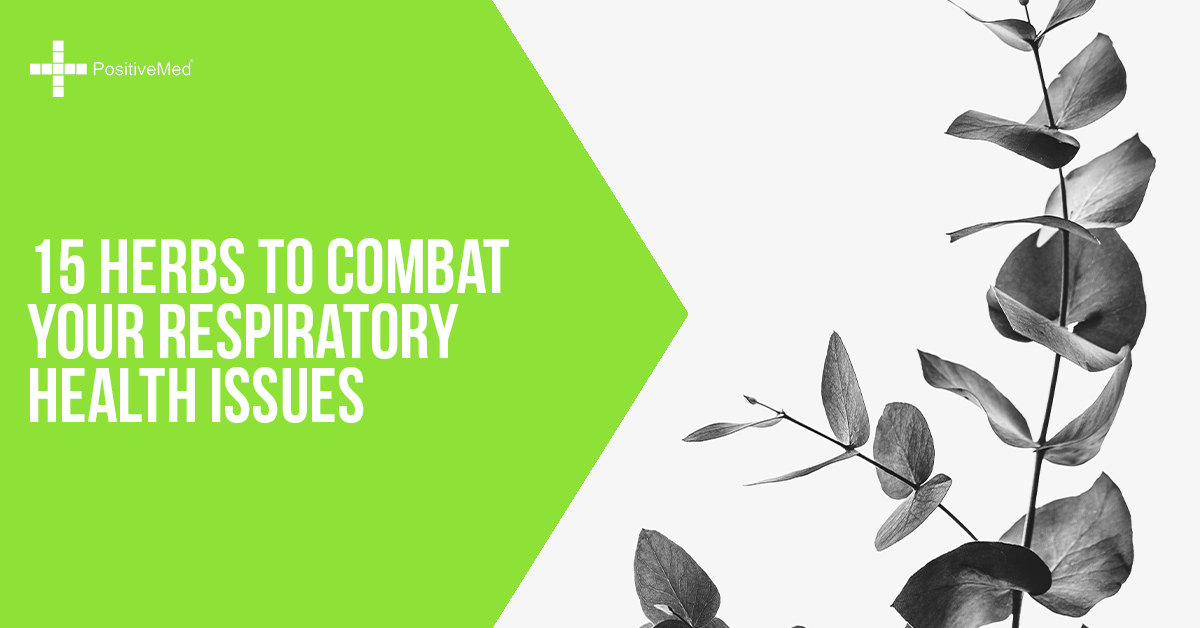Whether you have respiratory health issues or not, it is important to take care of your lungs. Your lungs work constantly every day, and irritants such as pollutants, dust, and other microbial particles enter and irritate the respiratory system. Combat these common issues naturally with the following herbs:

1.EucalyptusEucalyptus can benefit the respiratory in both leaf and oil form. It is commonly found in cough syrups and lozenges, and you can apply the oil to the skin (in a diluted form only) to relieve inflammation and pain of the respiratory tract. WebMD warns eucalyptus oil also should never be taken orally.
READ ALSO: What The Color Of Your Mucus Says About Your Health
2. LobeliaOften used for horses, this powerful herb contains the powerful alkaloid lobeline which breaks congestion in the lungs. It also reduces coughs by relaxing the muscles. Lobelia can be taken in tea, capsule, fluid extract or in tincture form. Your lobelia dosage should never surpass 20mg; consumption of over 500mg could result in death.
3. OreganoThe antibacterial, antiviral and anti-inflammatory properties make oregano natural histamine and congestion eliminator. Diluted oregano oil rubbed on the chest opens bronchial and lung passages along with adding a healthy amount to a vaporizer for continued relief.
4.PeppermintThe peppermint herb naturally contains menthol which promotes easier breathing by opening up the respiratory tract. Peppermint can be taken in tea form, created into oil and rubbed into the chest for a soothing decongestant effect and the leaves can even be eaten plain.
5.Plantain LeafThe plantain leaf contains aucubin, tannins, and mucilage to reduce upper respiratory health issues and infections. Create plantain tea from leaves (fresh or dried) to allow its antiviral, antibacterial and antimicrobial properties to relieve inflammation and infection in the lungs.
6. Osha RootOsha root contains a large amount of camphor to increase lung circulation and reduce inflammation caused by allergies, asthma and airborne pollutants. Osha root is often found in lozenges and cough drops to reduce cold and flu symptoms, liquor, and its numbing properties are especially effective for sore throats. This herb is also available in tea, capsule and tincture form. Pregnant or breastfeeding women should not take the osha root.
7. ChaparralChaparral contains NDGA and antioxidants to fight respiratory tract irritation and histamine reactions. This herb is most effective in tea form for the respiratory system and is also available in a tincture extraction form.
RELATED ARTICLE: Clean Up Your Lungs From Tar And Nicotine And Prevent Cancer With This Ancient Elixir
8. Licorice RootThe Hearty Soul states that this savory herb contains antiviral and antibacterial components to fight agents that cause lung infections. This herb also contains saponins to reduce congestion and also reduce bronchial spasms. Taking licorice root in tea form soothes the throat and cleanses mucus from the lungs and digestive tract, and it has even been found in some cases to prevent lung cancer cells from developing.
9. ThymeThe antibacterial, antihistamine, anti-inflammatory, antitussive and anti-fungal properties of thyme make this herb a powerful weapon against colds, the flu, sinus infections, asthma, and allergic reactions. Thyme is able to fight both viral and bacterial respiratory infections and helps clear mucus. Thyme can be taken in the form of infused and essential oil and rubbed into the chest, placed in a vaporizer for steam inhalation, added to mouthwash and the leaves can be boiled to create a tea. Pregnant women should not take thyme.
10. LungwortLungwort is a powerful plant that contains high mucilage and antioxidant properties. Lungwort can be eaten raw, incorporated into a tincture or taken in capsule form. Leaves should be boiled into a tea for soothing respiratory health benefits.
11. Sage
The admirable list of sage’s properties are as follows:
-Anti-bacterial
-Anti-fungal
-Anti-spasmodic
-Anti-hydrotic
-Anti-inflammatory
-Vermifuge
-Anti-septic
-Anti-viral
-Aromatic
-Anti-microbial
-Carminative
-Spasmolytic
Many of these properties relieve respiratory health issues; sage taken in tea form is the most effective way to relieve breathing issues, sore throat, and congestion. It is not recommended for pregnant and nursing women to take this herb.
12. MulleinMullein contains anti-inflammatory agents that clear the respiratory tract, strengthens the lungs and clears mucus from the lungs. Mullein can be taken in a tincture, but it is the most effective when boiled to make a tea.
13. ElecampaneBoil elecampane leaves three times daily for up to three weeks to allow its antibacterial properties to fight lung infections. According to the University of Michigan Health System, this herb loosens and eliminates mucus and is especially effective for conditions such as bronchitis, asthma, and severe cough.
14. ColtsfootThe antitussive and anti-inflammatory properties of this herb make it an effective relief for chronic cough and sore throat. This herb is now illegal for internal use in Germany and not recommended for pregnant and nursing women, but it is considered to be generally safe. Coltsfoot is typically taken in tea form, and should not be used for more than one month in this manner.
15. AngelicaThis herb relieves dry, harsh coughs by acting as an antispasmodic for lung tissue. Its antimicrobial and expectorant properties make it a preferred choice for cloudy, clear or white mucus.
The earth has created remedies for us; all we have to do is become educated about them. Be sure to inquire with your doctor to be sure that any chosen herbs will not interfere with current medications or underlying medical conditions, and always contact your doctor if you do not experience any positive changes to your ailments after one week.








